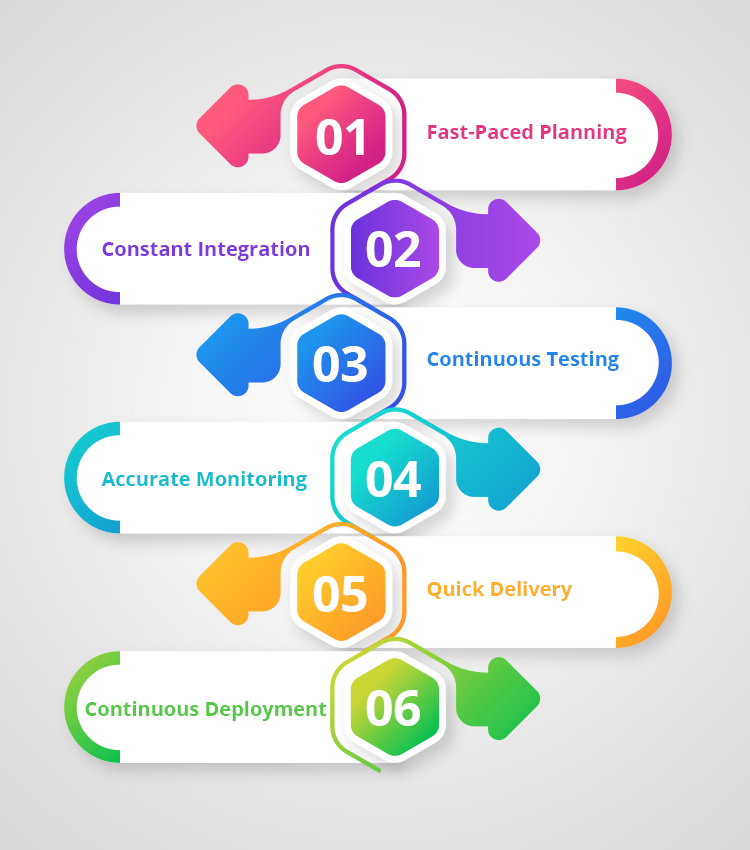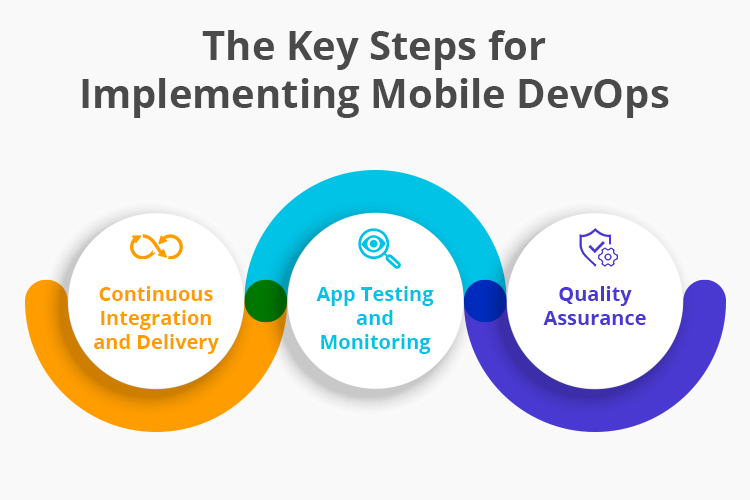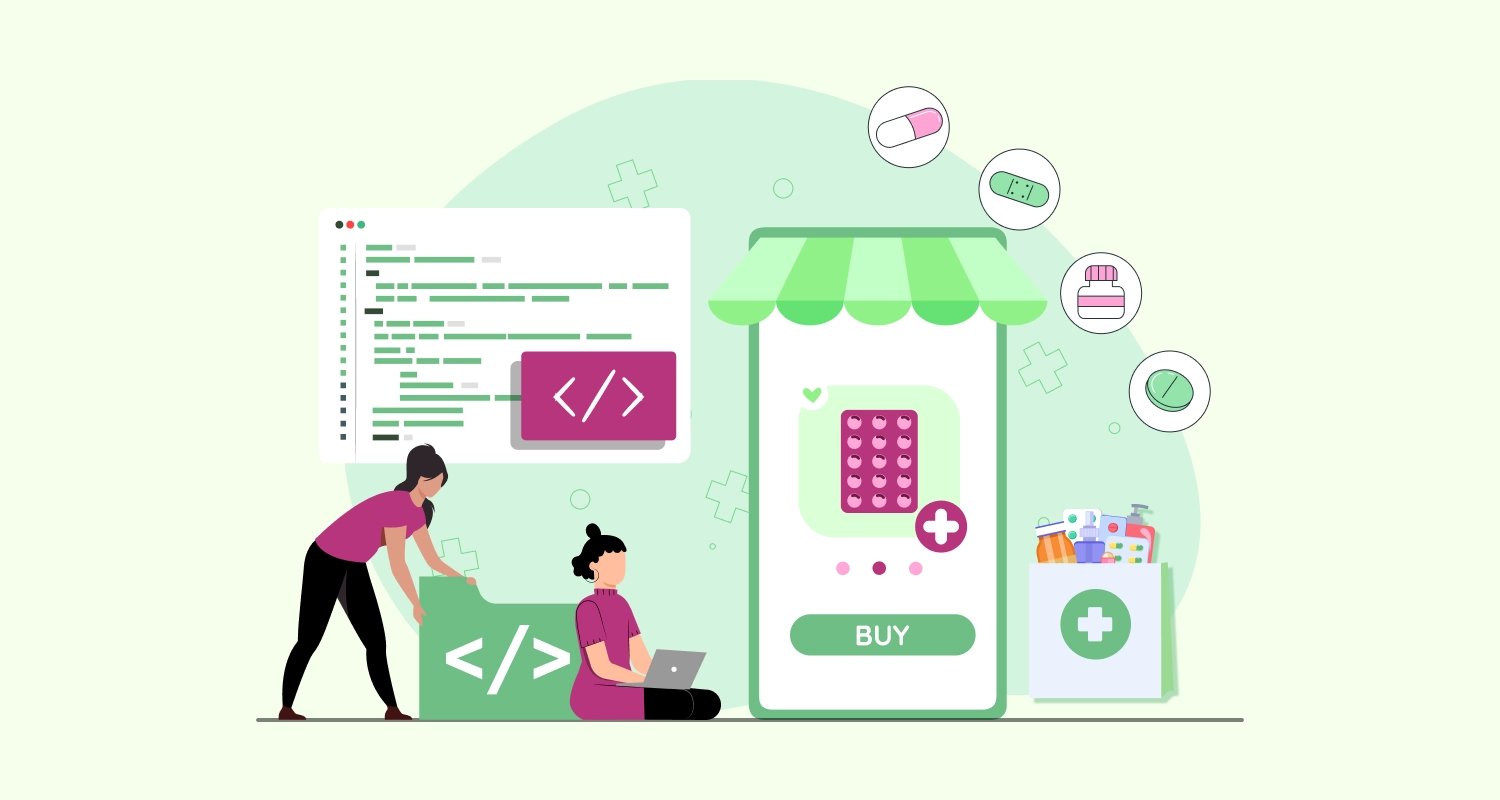As the mobile app industry is growing at a rapid rate and as there are no signs of slowing down in the near future for the app industry, a speedier development process has become a cornerstone for mobile app development services. In spite of the growing demands of the mobile apps among businesses who want to shape their mobile presence, the crucial aspects like development costs, data security, quality of code, and app maintenance cannot be left on the backburner. DevOps is the development approach to mitigate these quality concerns with the pace of development.
DevOps approach for mobile app development refers to a modern approach that equally ensures seamless application development and delivery right from the inception to production. DevOps as the development approach easily breaks the barrier between development and operations barrier and is regarded as a beneficial departure from the traditional sequential development approach.
What Exactly is DevOps?
DevOps is a unique app development approach that brings together the collaborative inputs of all the stakeholders and developers involved in building an application product. The approach mitigates the collaboration of developers from multiple disciplines within the company including project managers, app developers, and operation staff members.
In complete contrast to the traditional development techniques and process of software development that requires additional development time, cost and involves the risk of customer dissatisfaction, DevOps by bridging the gap between development and operations and by winning over the challenges for continuous software delivery, ensures building better app products.
The key idea behind DevOps mobile app development approach is to encourage collaboration among different teams that earlier had to work in silos. In that regard, it is not just a development approach but a state of mind that wants to achieve better development output through collaboration. It incorporates multiple development approaches including agile development, continuous delivery and automation. Because of DevOps, you don’t need to hire mobile app testing services as testing and quality assurance is integrated into the DevOps approach. This integrated and collaborative approach ensures a more efficient and faster software application delivery.
Thanks to DevOps, for businesses it has become a lot easier to work on business objectives all through a project and deliver greater value to the customers. This is why embracing DevOps approach in app development is so much beneficial. This also helps businesses to ensure a better return on investments through their app projects.
Various studies confirmed the benefits of a DevOps approach for businesses. Some reports suggest that organisations that used the DevOps development approach garnered a 63% more positive experience for their software quality. The same reports also suggest that 63% of these businesses by implementing DevOps can release new software applications more frequently.
Read More: Guide To Pursue DevOps Agile Development Cycle
How to Implement a DevOps Approach to Your Business?
Mobile apps are designed and developed for comparatively smaller screens with different outputs of touch as compared to web applications. Additionally, this needs to be implemented using a few tactics known as the basic thumb rule for adapting to DevOps in business. An Android app development company adopts DevOps in their development process in many ways.
Here is an example of the programming languages that are essential for the success of DevOps.
Fast-Paced Planning
Thanks to DevOps approach you can now bring your entire team of developers, testers, BAs, and operation staff for evaluating the scope of the mobile app along with a detailed plan for development and implementation tasks.
Constant Integration
This phase in the DevOps development process actually focuses on following the best development standards and practices as established by the community and the version control protocol.
Continuous Testing
This crucial step in the custom software and mobile app development cycle focuses on ensuring the app quality through continuous testing at different phases of the development process.
Accurate Monitoring
This is the phase of the development process ensuring the performance of the mobile app as per the requirements by continuously evaluating the changes and the deviations.
Quick Delivery
This practice in the DevOps approach ensures making the source code ready for deployment in a production environment by assuring that the changes fit into a production-like environment.
Continuous Deployment
All changes that go through the automation testing needs to be automatically deployed to the production environment and this process ensures that.
The Key Steps for Implementing Mobile DevOps
When you want to implement mobile DevOps, you must have an idea about how the mobile app environment stands apart from the desktop app environment. In complete contrast to desktop apps, mobile apps are likely to get downloaded and used on a variety of mobile devices. As a bigger point of difference, we have a wide array of networks that can run mobile apps. Naturally, the mobile app development process is likely to be more complex than the process of development for traditional mobile apps.
Here are the 3 key steps for implementing DevOps in the mobile app development process.
Continuous Integration and Delivery
In this step, mobile app developers write the source code in such a way that the code can be easily integrated with other codes. This also ensures that the code written by one team can easily link with the code distributed by another team of mobile app developers. This is where the app developers should make sure that all the assets in the app development process such as documents, code, scripts, text files, configurations and other assets remain traceable.
App Testing and Monitoring
For mobile app development projects, a number of aspects pulling down the app performance or app output should be taken into consideration. From different screen size, resolution, capabilities, features, and various aspects of each mobile device need to be considered.
This is where the importance of mobile app testing stays out. The app testing instead of taking help from emulators and simulators should be done in real environments. Mobile app testing throughout the project needs to be carried out on a continuous basis on the actual devices and using a similar infrastructure where the app is going to be deployed. This stage in a DevOps approach by embracing automated app testing makes the app development process better to clear the app from bugs and various issues.
Quality Assurance
DevOps by its integrated process comprising various niches also gives too much importance to validation and measurement of various code parts in the app and takes care of it right from the distribution. The quality assurance process continuously tracks the ratings and feedback received by the app on the Mobile App Store. This helps in detecting the bugs and making way for subsequent changes and growth.
Read More: DevSecOps: DevOps Development Approached Security As A Key Element
Conclusion
DevOps is a comprehensive development approach that takes all-round care to ensure quality and faster development of apps. No wonder, in the years to come it will continue to rise in popularity as the most effective and efficient development approach.











